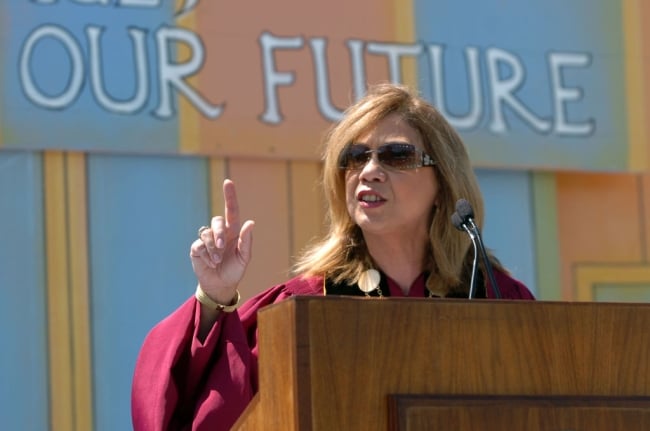You have /5 articles left.
Sign up for a free account or log in.

Mildred García, former president of Cal State Dominguez Hills, will be the first Latina to lead the 23-campus university system.
The California State University Board of Trustees has appointed Mildred García, president of the American Association of State Colleges and Universities and an experienced higher ed administrator, as the next chancellor of the system.
Her selection was announced Wednesday at the board’s monthly meeting.
“It was a daunting task” to identify an individual who embodies the ideal qualities needed to lead the nation’s “most diverse” and “most consequential” university system, Wenda Fong, chair of the CSU Board of Trustees, said at the meeting. “It requires a leader of both principle and compassion, one with a demonstrated commitment to our mission and core values, and one with a heart for the diverse and talented students. I have every confidence that … we have identified exactly that leader.”
García, who will be the first Latina to lead the 23-campus system, was previously president of Cal State Fullerton and Cal State Dominguez Hills, both part of CSU.
She described the system as “a powerful engine of change and upward mobility for California and the nation” that helps hundreds of thousands of students reach their educational, career and personal aspirations.
“I am honored, humbled and excited for this opportunity to serve the nation’s largest four-year university system and work alongside its dedicated leaders, faculty and staff, and its talented and diverse students to further student achievement, close equity gaps and continue to drive California’s economic prosperity,” García said in a CSU press release about the announcement.
She will start in her new role on October 1 and will be paid $795,000 annually and will receive $80,000 in annual deferred compensation, according to EdSource. She will also receive a $8,000 monthly housing allowance and a $1,000 monthly auto allowance.
Garcia will be leading a system that serves nearly 460,000 students and employs 56,000 faculty and staff. She and is taking over at a time when public confidence in higher ed is declining, enrollment is falling and CSU is facing a $1.5 billion budget gap. She said addressing funding pressures and enrollment losses and closing equity gaps would be among her biggest challenges.
“Where are we going to get those resources? I have to sit down, get completely briefed on what’s happened already and then figure out how we’re going to move forward,” she said during an interview Wednesday.
She also noted the demographic trends that are contributing to enrollment declines at colleges across the country, including at CSU institutions, where enrollment has fallen by 27,558 students in the last two years alone.
“Communities are changing,” she added. “So how do we understand the neighborhood we live in, the cities that we serve? … How do we reach out to them?”
García will also have to help restore trust in CSU, internally and externally, after a string of scandals involving the mishandling of sexual misconduct allegations led to the ouster of the previous chancellor and another system leader.
The former chancellor, Joseph I. Castro, resigned in 2022 amid mounting criticism for his decision, as president of Fresno State, to recommend a $260,000 payout and retirement package for a vice president who had been the subject of sexual harassment complaints. The departure led to an external review of the system’s Title IX processes and a highly critical report. (This paragraph was revised to clarify that Castro recommended the $260,000 payout, which was then authorized by the then CSU chancellor, Timothy P. White.)
Jolene Koester, CSU’s interim chancellor, said the report offered an “unflinching” examination of problems in the system’s Title IX oversight and presented an opportunity for CSU to strengthen its cultures of compliance and care.
García said she would keep campus administrators accountable and ensure they are committed to addressing and reducing sexual misconduct and complying with the recommendations of the report.
“My job is to make sure that that report is implemented,” she said. “Accountability is important when it comes to Title IX. That’s why you’re the boss. You have to hold people accountable.”
García, a first-generation college student, was raised by Puerto Rican parents in Brooklyn, N.Y. She has long promoted her belief that colleges and universities can foster socioeconomic mobility for students with backgrounds like hers by closing equity gaps in enrollment and graduation rates.
“I see myself in the students,” she said. “The situations may be different, but I know what it means to really want to get a degree and what you need to do to do it, and I know it’s not easy for many of our students.”
García said she plans to continue promoting equity by assessing existing CSU projects such as Graduation Initiative 2025. She believes other CSU initiatives to close equity gaps could serve as a model for other higher ed institutions in the wake of the Supreme Court’s recent ruling barring affirmative action in college admissions. She noted that CSU found ways to continue its equity work without violating a 1996 state law that banned affirmative action programs in public employment, public education and public contracting.
“California has a lot to teach on how to do diversity, equity and inclusion,” she added.
The Campaign for College Opportunity, a California-based research and advocacy organization, praised the selection of García as chancellor and cited her commitment to racial equity and improving student outcomes.
“Dr. García holds a clear equity track record and unwavering dedication to advancing student success,” Michele Siqueiros, president of the campaign, said in a statement. “We know that Dr. García will make decisions with a student-first lens and an unapologetic commitment to racial equity.”




